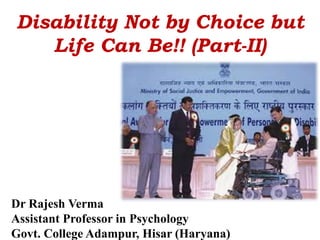Disability Not by choice But Life Can Be part ii
- 1. Disability Not by Choice but Life Can Be!! (Part-II) Dr Rajesh Verma Assistant Professor in Psychology Govt. College Adampur, Hisar (Haryana)
- 2. 15. We must know that the disabled do not differ on conative, cognitive or affective. 16. The disabled are found to be more conscious and sensitive about self and what other feel/talk about them. For example, HI individuals have a good deal of Lip reading, VI individuals have good tactile sense [Helen Keller].
- 3. 17. Let us work of ŌĆśPrinciple of InclusionŌĆÖ. It will ensure sense of belongingness which is psychological need. Fulfilment of psychological need gives intense satisfaction more than fulfilment of physiological need.
- 4. 18. ŌĆśCare giverŌĆÖ is a offensive term can it be ŌĆśFriend in NeedŌĆÖ or any other phrase you can think (ÓżÅÓżĢ Óż¼ÓżŠÓż░ ÓżĖÓźŗÓżÜÓż©ÓżŠ Óż£Óż░ÓźéÓż░). Children!!! 19. Kindly do not set goals for them, let them decide what they want to be? And then only help them.
- 5. 20. Patience is the key to build a genuine and long lasting relationship especially when dealing with people who suffer from stammering. 21. Do you an individual who could not speak until the age of 3 and difficulty in doing maths? And another one who could not read up to the age of 12.
- 6. 1. Dhritrashtra was disable by birth but had a great trait of digesting criticism [ÓżĄÓż┐Óż”ÓźüÓż░ Óż©Óźć ÓżÅÓżĢ Óż¼ÓżŠÓż░ ÓżĢÓż╣ÓżŠ ÓżźÓżŠ ÓżĄÓżĢ Óż”ÓźüÓż░ÓźŹÓż»ÓźŗÓż¦Óż© ÓżåÓż¬ÓżĢÓżŠ Óż░ÓźŗÓżŚ Óż╣Óźł]. 2. Interestingly Gandhari was disable by choice but reaped a big reward by virtue of her choice.
- 7. 3. The Indian traditional thought ŌĆ£I, the soul, have a bodyŌĆØ and Western thought, ŌĆ£I the body, have a soulŌĆØ. Therefore it is inappropriate to term someone as disabled or diseased since that is a condition of the body and not of the soul, which remains untouched and unchanged by any circumstance of the body (iskconnews.org).
- 8. 4. Rishi Astavakra. 5. Story of Socrates (The World Is What You Like To Think It Is).
- 9. Behavioural Model Able- bodied Understand & Respect their RIGHTS Know your DUTIES w.r.t. disabled Moral responsibilities Ethical Accountability Strengthened the bond of faith Leaving no scope for Sympathy
- 10. References: 1. French Gilson, S. & Depoy, E. (2000). Multiculturalism and disability: A critical perspective. Disability and Society, 15, 207ŌĆō218. 2. Hansen, M.S., Fink, P., Frydenburg, M., Oxhoj, M.L., Sondergaard, L. & Erisken, M. (2001). Mental disorders in medical inpatients and the association to severity of illness, self-rated physical disability and health perception. Psychosomatics, 42, 41ŌĆō47. Internet Sources: 1. https://iskconnews.org/on-disability,6757/


![15. We must know that the disabled do not differ
on conative, cognitive or affective.
16. The disabled are found to be more conscious
and sensitive about self and what other feel/talk
about them. For example,
HI individuals have a
good deal of Lip
reading, VI
individuals have good
tactile sense
[Helen Keller].](https://image.slidesharecdn.com/notbychoicepartii-200228134208/85/Disability-Not-by-choice-But-Life-Can-Be-part-ii-2-320.jpg)



![1. Dhritrashtra was disable by birth but
had a great trait of digesting criticism [ÓżĄÓż┐Óż”ÓźüÓż░ Óż©Óźć
ÓżÅÓżĢ Óż¼ÓżŠÓż░ ÓżĢÓż╣ÓżŠ ÓżźÓżŠ ÓżĄÓżĢ Óż”ÓźüÓż░ÓźŹÓż»ÓźŗÓż¦Óż© ÓżåÓż¬ÓżĢÓżŠ Óż░ÓźŗÓżŚ Óż╣Óźł].
2. Interestingly
Gandhari was
disable by choice
but reaped a big
reward by virtue
of her choice.](https://image.slidesharecdn.com/notbychoicepartii-200228134208/85/Disability-Not-by-choice-But-Life-Can-Be-part-ii-6-320.jpg)




